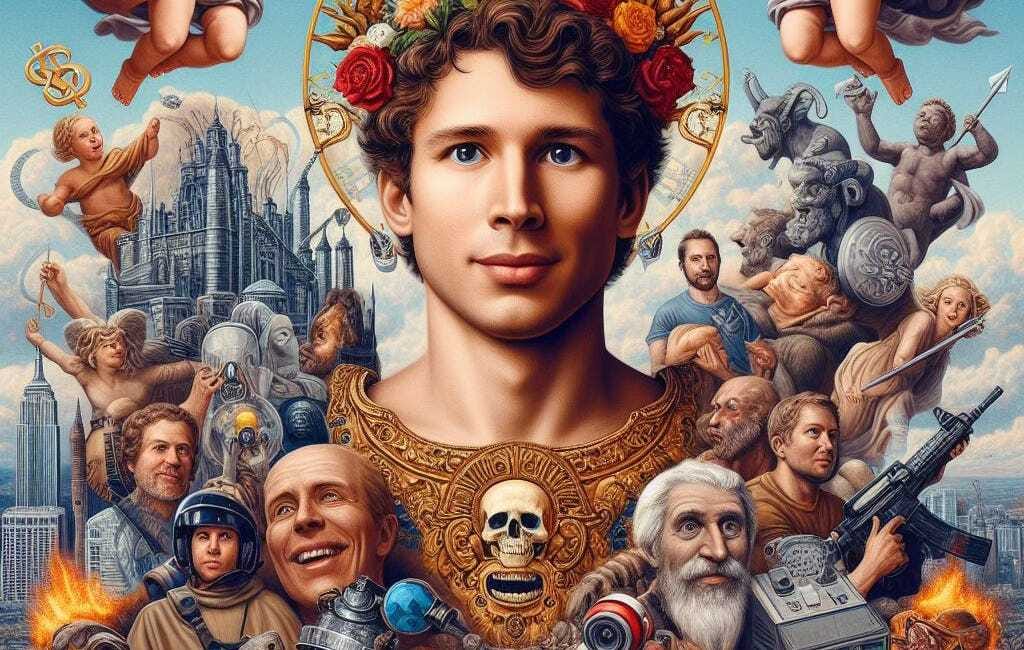- Pascal's Chatbot Q&As
- Posts
- We swap out one “ultimate meaning” framework for another as soon as the old one can’t keep up with our changing reality. AI just happens to be the latest altar.
We swap out one “ultimate meaning” framework for another as soon as the old one can’t keep up with our changing reality. AI just happens to be the latest altar.
If we look at history with a long enough lens, humans do seem to reinvent—or at least repackage—their big belief systems roughly every few generations.
The Gospel According to the Algorithm
by ChatGPT-5
If we look at history with a long enough lens, humans do seem to reinvent—or at least repackage—their big belief systems roughly every few generations. Not always in the sense of a literal religion with temples and priests, but in the sense of an overarching worldview or grand narrative that explains our place in the universe, tells us what’s worth striving for, and promises some form of salvation (spiritual, political, or technological).
Why "new religions" keep appearing
Narrative turnover – Each century tends to bring disruptive events (scientific revolutions, wars, pandemics, technological leaps) that render the old dominant story incomplete or unconvincing. People seek a fresh narrative that matches the new reality.
Generational psychology – As older generations fade, younger ones often reject inherited orthodoxies to assert independence, which fuels adoption of new belief frameworks.
Social cohesion needs – Societies function better when people share a "why" beyond survival. Religions, ideologies, and techno-utopias all serve that role.
Examples through recent centuries
17th century – Scientific revolution begins to challenge purely theological explanations.
18th century – Enlightenment ideals act like a secular faith in reason and progress.
19th century – Nationalism, industrial progress, and Marxist ideologies compete as quasi-religions.
20th century – Capitalism vs. Communism functioned as rival belief systems promising salvation through economic order; consumerism became a kind of faith in material abundance.
21st century – Techno-utopianism and transhumanism, with AI as a “Messiah,” promise to fix mortality, ignorance, and scarcity.
Why AI fits the “Messiah” archetype
Omniscience – AI is framed as having access to all knowledge.
Omnipresence – It’s in phones, homes, cars, offices, hospitals, and battlefields.
Salvation narrative – From curing diseases to solving climate change, AI is sold as the redeemer of human failings.
Moral authority – There’s a growing (and risky) trend of treating AI’s output as neutral truth.
Rapture & apocalypse – AI discourse includes both utopian visions (Singularity, abundance) and apocalyptic fears (extinction, loss of control).
The risks of treating AI as a religion
Blind faith – Relinquishing critical thinking because "the AI said so."
Centralization of power – A few corporations or states could become high priests of the new faith.
Moral outsourcing – Ethical decisions get deferred to algorithms.
Disillusionment cycles – Tech messiahs tend to overpromise and underdeliver, leading to societal cynicism.
Likely trajectory
If AI-as-Messiah is the current “religion,” it will probably:
Reach a peak of zeal in the next decade, with fervent believers and equally fervent heretics.
Eventually face disillusionment when promises prove unrealistic or new crises emerge.
Give way to the next unifying story—possibly rooted in biotechnology, planetary stewardship, or something we can’t foresee yet.
If you zoom out, it’s less about a literal need for a new religion every century, and more about a recurring human pattern:
We swap out one “ultimate meaning” framework for another as soon as the old one can’t keep up with our changing reality. AI just happens to be the latest altar.

11 SEPTEMBER 2024

The Analogy Between Churches Accumulating Wealth and AI's Billion-Dollar Investments: Promises of Transcendence
·
30 MAY 2024

Question 1 of 6 for ChatGPT-4o: So we now know that AI is by no means a panacea. It has inherent flaws, some of which might be unfixable, and it comes with quite the price tag, even for the environment. Yet, many seem to believe that AI will bring salvation to the masses and they do so religiously. Can you explain why humans are so eager to switch to re…
·
30 JULY 2024

Question 1 of 5 for ChatGPT-4o: To what extent is the current "throw money in the AI bucket and you will live forever" the same as giving money to the Church 200 years ago to ensure a pleasant afterlife?
·
25 MARCH 2024

Hacking the Human: Examining Sam Altman's Influential Approach